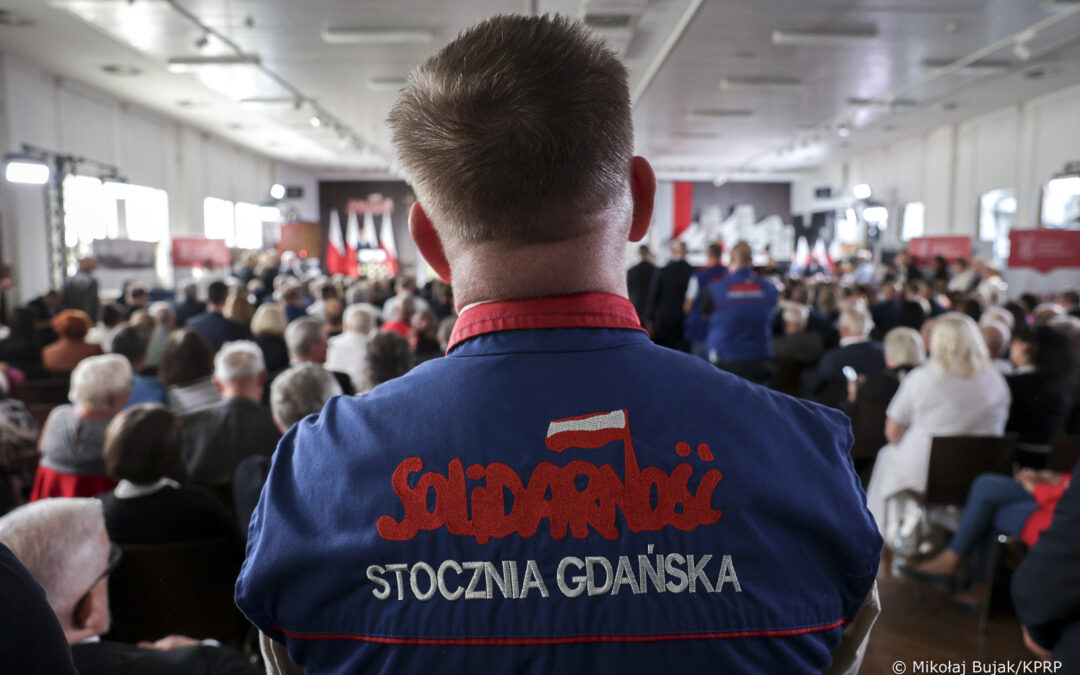Keep our news free from ads and paywalls by making a donation to support our work!

Notes from Poland is run by a small editorial team and is published by an independent, non-profit foundation that is funded through donations from our readers. We cannot do what we do without your support.
The Solidarity (Solidarność) trade union, which played a central role in bringing down Poland’s former communist regime, has won a long-running legal battle over the rights to its logo, which has become famous around the world as a symbol of the struggle against oppression.
The head of the union, Piotr Duda, announced that the court of appeal in Warsaw had issued a ruling that ends a legal dispute with the original designer of the logo, Jerzy Janiszewski, who Solidarity accused of illegally granting licences to use the logo and of himself exploiting it commercially.
“This symbol has always been an integral part of our identity and history, so I am pleased that we now finally have indisputable confirmation of our rights,” said Duda.
“This is important not only from the point of view of tradition, but also in practice – it gives us a strong, clearly defined argument in situations where the sign is used unlawfully or in a manner contrary to its spirit,” said Duda.
Janiszewski created the logo in 1980 during the Gdańsk shipyard workers’ protests against the communist regime, drawing inspiration from graffiti and slogans scrawled on the walls of shipyards, factories and residential blocks.
His design quickly became Solidarity’s official symbol as it fought throughout the 1980s for great rights for workers and others, as well as more broadly against the communist system.
The logo has also been adopted and adapted by other individuals and groups fighting for civil rights and resisting authority, frequently reworked by artists as commentary on contemporary social and political events.
For example, during Poland’s mass protests in 2020 against a near-total abortion ban, the Solidarity logo was reworked to feature one of the main slogans of the demonstrators: “Wypierdalać”, a vulgar term roughly meaning “Fuck off”.
Solidarity had long complained about what it claimed was Janiszewski’s illegal use of the logo, and in 2022 launched legal action against him.
Last year, the district court of Gdańsk awarded copyright of the logo to Solidarity, ordering Janiszewski to cease licensing or sharing it in any form. That decision has now been upheld on appeal.
Janiszewski, who also designed the logo for Poland’s EU presidency this year, has not publicly commented on the case so far. However, in 2020, after Solidarity tried to prevent him from making modifications to the logo, the designer argued that “the ‘Solidarity’ symbol is not a logo or a trademark of a trade union”.
He claimed that their actions against him “have nothing to do with true Solidarity – the one people hold in their hearts, the one this symbol symbolises”, reported Press magazine at the time.
Speaking this year to the Culture.pl website, Janiszewski said that the Solidarity logo should be seen as a “national asset” whose “significance, historical legacy, and context in which it is used should be protected just as much as its graphic integrity”.
The designer also noted that, “in August 1980, when the symbol was created, copyright law in Poland was a virtually abstract concept, with no real possibility of proper oversight”.
That has resulted in widespread re-use of the logo without regard for his rights, said Janiszewski. He was particularly critical of its exploitation by right-wing groups whose actions are not compatible with “the struggle and sacrifices for a free, independent Poland, for the rule of law, and for fundamental human rights”.
By contrast, since the fall of communism, Solidarity, which remains Poland’s largest trade union, has become increasingly aligned with right-wing political groups, in particular the Law and Justice (PiS) party that is currently Poland’s main opposition.

Notes from Poland is run by a small editorial team and published by an independent, non-profit foundation that is funded through donations from our readers. We cannot do what we do without your support.
Main image credit: Mikołaj Bujak/KPRP

Alicja Ptak is deputy editor-in-chief of Notes from Poland and a multimedia journalist. She has written for Clean Energy Wire and The Times, and she hosts her own podcast, The Warsaw Wire, on Poland’s economy and energy sector. She previously worked for Reuters.



















